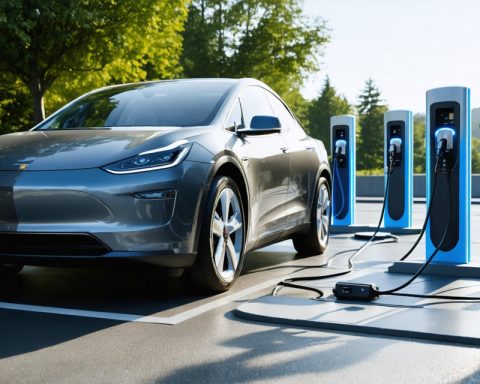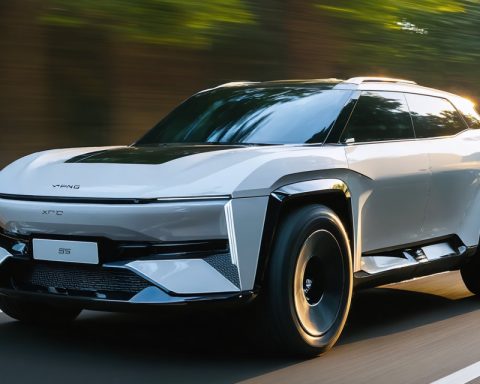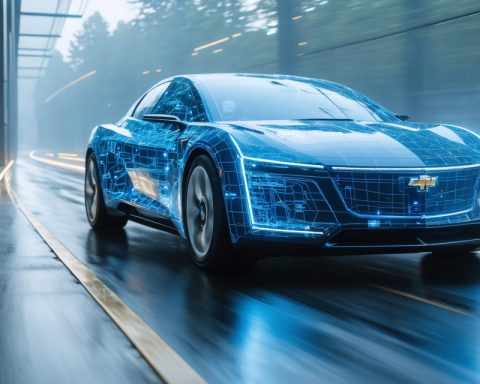- Gelion plc collaborates with Germany’s Max Planck Institute to advance sulfur battery technology.
- MPI’s nano-confined carbon/sulfur composites aim to enhance battery power, energy density, and longevity.
- The partnership could lead to batteries that charge in minutes and offer robust energy capacities.
- Na-S batteries demonstrate rapid charge/discharge rates and extended cycle life, beneficial for stationary storage and EVs.
- Using abundant and cost-effective elements like carbon, sodium, and sulfur aligns with sustainability goals.
- Promises of lithium-sulfur batteries surpassing 400 Wh/kg energy density indicate significant potential advancements.
- Efforts to improve anode technology aim to enhance safety and longevity in battery design.
- The alliance seeks to make high-performance energy storage universally accessible over the next three years.
Amidst the bustling landscape of energy innovation, an electrifying development has emerged that promises to reshape the future of battery technology. Gelion plc, a pioneer in energy storage solutions, has joined forces with Germany’s esteemed Max Planck Institute (MPI) to forge a novel path in the realm of sulfur batteries. This collaboration capitalizes on MPI’s groundbreaking nano-confined carbon/sulfur composite breakthroughs, poised to redefine the boundaries of power, energy density, and cycle longevity in batteries.
Picture this: a world where battery charging takes mere minutes, offering staggering energy capacities that outshine many contemporary technologies. This isn’t just a dream. It’s becoming a reality thanks to the Gelion-MPI partnership. By integrating advanced nano-engineering with cutting-edge battery design, they are ushering in a new era for sulfur-based storage technologies.
The essence of this breakthrough lies in MPI’s novel sulfur composite technology, which has demonstrated unparalleled versatility in sodium-sulfur (Na-S) cells. These batteries not only endure hundreds of charge cycles but also support rapid charge and discharge rates, setting a new benchmark in efficiency and application versatility. Imagine batteries that charge faster than a coffee break, a game-changer for long-duration stationary storage and the electric vehicle sector.
Yet, what truly stands out is how this innovation taps into the abundant resources of carbon, sodium, and sulfur. These elemental powerhouses are not only cost-effective but are also readily available, aligning perfectly with global sustainability goals. With lithium-sulfur developments showing promise of crossing the 400 Wh/kg energy density threshold, the practical implications are vast—from powering homes to propelling vehicles.
Collaborating with MPI, Gelion is poised to unlock new methodologies that improve key battery components. By focusing also on anode technology, they aim to boost both safety and longevity, addressing industry concerns that have long hindered broader adoption.
This strategic alliance, while technical, feels refreshingly simple in its promise: to make high-performance energy storage universally accessible. Over the next three years, Gelion will be at the forefront, combining its innovative battery designs with MPI’s scientific prowess. Together, they aim to deploy commercially viable solutions that meet the evolving needs of a world increasingly reliant on renewable energy sources.
The takeaway from this riveting partnership? A future where high-performance, sustainable batteries redefine energy for everyone is just on the horizon. The collaboration between Gelion and MPI is not merely about creating a better battery; it is about reinventing the foundation of energy storage for a world eager for clean, efficient power solutions.
Revolutionizing Energy Storage: How Sulfur Batteries Could Power the Future
In the ever-evolving world of energy technology, Gelion plc and the Max Planck Institute (MPI) are setting a new standard with their groundbreaking work on sulfur batteries. This collaboration marks a significant leap forward in energy storage, offering promises of unparalleled power, energy density, and cycle longevity.
Understanding the Breakthrough in Sulfur Batteries
Advanced Nano-Engineering:
The essence of Gelion and MPI’s collaboration lies in utilizing MPI’s novel sulfur composite technology. By integrating nano-confined carbon/sulfur composites, these batteries enhance energy storage capabilities, allowing faster charging and discharging. This advanced engineering addresses the long-standing challenges of cycle efficiency and energy density in traditional batteries.
Sodium-Sulfur (Na-S) Technology:
The breakthrough in sodium-sulfur cells is pivotal for the next generation of energy storage. These cells endure hundreds of charge cycles, supporting fast charging akin to a coffee break. Such technology proves crucial for long-term stationary storage and burgeoning electric vehicle markets.
Real-World Applications and Benefits
Cost-Effectiveness and Sustainability:
The use of carbon, sodium, and sulfur not only reduces costs but also leverages abundant resources, aligning with global efforts toward sustainability. The shift from lithium-based to sulfur-based technology promises cleaner, more affordable energy solutions that minimize environmental impact.
High Energy Density:
With lithium-sulfur developments achieving over 400 Wh/kg, the potential for sulfur batteries extends from residential energy storage to powering electric vehicles. This positions them as a transformative technology in the push for renewable energy systems worldwide.
Addressing Pressing Questions
How do sulfur batteries compare to lithium-ion batteries?
Sulfur batteries offer several advantages over traditional lithium-ion batteries, including increased energy density, reduced cost due to cheaper materials, and improved cycle life due to innovative composites. However, continued research and development are needed to overcome challenges like sulfur’s inherent conductivity issues.
What are the environmental benefits?
The environmental footprint of sulfur batteries is potentially much lower than that of lithium-ion batteries. The use of widely available and non-toxic materials such as sodium and sulfur reduces both the ecological and financial cost of battery production and disposal.
Industry Trends and Forecasts
Market Potential:
As the demand for renewable energy and electric vehicles surges, sulfur-based batteries could capture a significant market share, especially if they achieve scalability and commercial viability. Industry analysts predict substantial growth in the global battery market, with a focus on sustainable technologies.
Pros and Cons Overview
Pros:
– High energy density
– Cost-effective materials
– Fast charge/discharge rates
– Reduced environmental impact
Cons:
– Technical challenges in conductivity
– Initial research and development costs
– Current lack of mass-scale production infrastructure
Quick Tips and Recommendations
For industry stakeholders looking to invest or develop in battery technologies, consider the following:
– Monitor Innovations: Stay informed about breakthroughs in nanotechnology and sulfur composite advancements.
– Focus on Sustainability: Prioritize projects that align with global carbon neutrality goals.
– Invest in R&D: Allocate resources to overcome existing technological hurdles in sulfur batteries.
Conclusion
The collaboration between Gelion and MPI is set to revolutionize energy storage, making high-performance batteries more accessible and sustainable. As the technology matures, it opens new possibilities for reducing reliance on fossil fuels and achieving energy security. This innovation not only aims to improve battery performance but also seeks to redefine the underlying principles of how energy is stored and utilized in a cleaner, more efficient world.
For more details on cutting-edge energy solutions, visit the Max Planck Institute.















